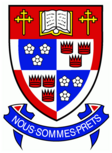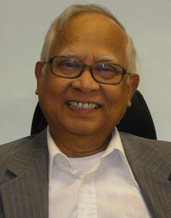

Department of Mathematics
Simon Fraser University
| Public Forum |
|
| About Dr. Das | |
Birth: 1934 Fields of Specialization:
Present Designation: Professor Emeritus Academic Record
Positions Held
Correspondence During my career, I had the enormous privilege of receiving letters from extraordinary individuals who shine brightly on the pages of history. I am particularly proud of this letter penned by Hans Albrecht Bethe, Nobel Prize for Physics in 1967 for his work on the theory of stellar nucleosynthesis.
|
|
Finally I got to carbon, and as you all know, in the case of carbon the reaction works out beautifully. One goes through six reactions, and at the end one comes back to carbon. In the process one has made four hydrogen atoms into one of helium. The theory, of course, was not made on the railway train from Washington to Ithaca ... It didn't take very long, it took about six weeks, but not even the Trans-Siberian railroad [has] taken that long for its journey.
~Hans Albrecht Bethe
Copyright © 2009 All rights reserved. Please do not reproduce any materials without permission.
